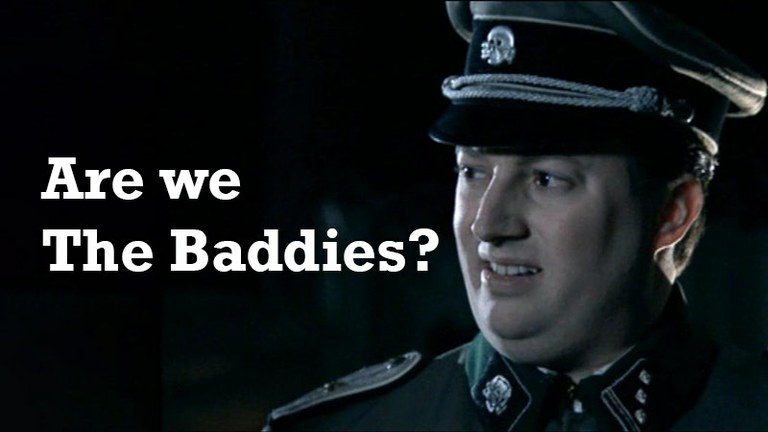The Afghan war was a long Khan
| filed under: Occupying, 9/11, Women and girls, War in Afghanistan, Occupier, OBL, Kabul, Taliban, September 11, Invasion, Afghani, Mujahideen, Osama bin Laden, 9-11, Afghan War, Occupationtl;dr: Afghanistan was invaded by the United States—not invited. Afghanis were our hostages, not our allies. The occupation was tolerated not enjoyed. Any US love was actually Stockholm syndrome.
I called this article The war in Afghanistan was a long Khan because:
-
I thought of it and it made me feel pleased with myself and clever
-
This isn’t Afghanistan’s first rodeo: they’ve suffered through long-term occupation by empires so often it’s a cliché trope
-
While occupied cities in Vietnam adapted to French and American occupation by feigning love for Joe, the Vietnamese never really loved Joe, only appeased Joe for reasons of survival during a massively chaotic and terrible war (note all the friendly villagers who routinely blew up their friend Joe in the streets).
-
South Vietnam invited America to help defend against the North; and, more relevantly, the Soviet troops were invited by the official Afghan authorities to help combat the Mujahideen. America wasn’t invited to Afghanistan.
-
Sometimes, the city-based leadership intelligentsia of a country can often be at odds with the will of the people.
-
Local Hawaiians hate their occupier any more than it pays their rent; Okinawans openly hate their occupiers, though what’re you going to do; I know that all of Islam is apoplectic about the mere existence of Riyadh Air Base in Saudi Arabia.
-
People never really fall in love with their oppressor, their occupier, or their hostage-taker. The power dynamic isn’t fair.
-
When you are poor and desperate and your occupier offers you a job, you take that job and milk that job for as long as it doesn’t get you killed and as long as it lasts.
-
Even someone who is beguiled by Stockholm Syndrome eventually snaps out of it—generally violently and without a lot of compassion and empathy.
-
Even HR knows: a subordinate employee cannot give full consent to a relationship with a superior when their job, income, reputation, and life depend on the fickle whims of their boss.
-
There were never only 80,000 Taliban fighters, there were 380,000 Afghani fighters, 300,000 of which were being trained, funded, paid, and supplied by their American invaders and occupiers until the moment we, the USA, left, which was always inevitable.
With that cleared up, as best as I can, since I am not a scholar, an historian, an academic, an intellectual, or even a rigorous writer, let’s see what this blogger comes up with (even I am pretty curious as to what I am about to go on about!)
The current narrative I am hearing all over the media over the last couple of days conveniently forgets the obvious truth that America has always been an occupying force after having, without consent, invaded Afghanistan as part of some sort of wild goose chase in support of the hunt of bin Laden in the wake of the attacks on the Twin Towers and the Pentagon on September 11th.
The only narrative on the TV, the radio, and in the funny papers is how much suffering the women and girls of Afghanistan will suffer in the wake of our rapid troop removal and the immediate fall of the Afghan National Army (ANA) to Taliban invaders. Let’s get some perspective on the loss of life over the course of the 20-years America has been at war in Afghanistan:
About 241,000 people have been killed in the Afghanistan and Pakistan war zone since 2001. More than 71,000 of those killed have been civilians
How many of those ~71,000 civilians do you reckon were women, girls, children, babies, and the elderly?
Also, the freedom offered to women and girls in modern Afghanistan isn’t freely extended to rural or poor women. If you explore Women in Afghanistan on Wikipedia you'll see that not many women in 21st century Afghanistan were independent, modern, feminist women. Like all countries, it has a lot to do with status, wealth, caste, to whom you were born, and if you lived in a city. Honor crimes and rural killing were still daily bread all over the country. Afghanistan hasn't been a feminist utopia since the 70s when it really was a very modern, feminist, country that was very much a friend to women—and had been since the 20s.

America didn’t go to Afghanistan to help women and girls or to bolster some liberal democratic government. America invaded Afghanistan in knee-jerk response to 9/11 and to hunt down Osama bin Laden. An invaded Afghani people who have suffered invader after invader simply adapts, appeases, profits, trains, grins, bears it, and waits until coffers drain and public support wanes. Then, count the money, inventory assets and spoils, then revert until the next empire forgets historical precedent.
First, Afghanistan was invaded by the United States—not invited. Afghanis were our hostages, not our allies. The occupation was tolerated not enjoyed. Any US love was actually Stockholm syndrome.
Our twenty-year mission in Afghanistan was not a United Nations, blue helmet, peacekeeping mission, or part of a State Department-funded USAID non-governmental organizational (NGO) project to liberate and educate oppressed women and girls.
This was was an assault, this was an attack, this was initiated by the tip of the American spear of war.
Invading armies don’t invade countries with armies solely to liberate women and girls from the oppression of fundamentalism, no matter how often the radio tells you so. It’s a red herring to pluck at your heartstrings:
A red herring is something that misleads or distracts from a relevant or important question.
The relevant and important question is: do the Afghani people consider America to be their allies or simply an occupational force that they just need to endure until they finally leave. It might be the latter considering how unwilling the 300,000-strong Afghani military force was willing to fight for American-style democracy the nanosecond they weren’t made to (paid to).
Just because hostage-takers and hostages fall in love doesn’t mean the love is real or the power dynamic even allows the sort of consent required for a healthy, sustainable, loving, marriage.
Stockholm syndrome is an emotional response. It happens to some abuse and hostage victims when they have positive feelings toward an abuser or captor.
The Taliban are not an invading force, flooding over the border of Iran or Pakistan, the Taliban are the same people who were the heroes of the Afghanistan war the Soviets fought and lost from Dec 24, 1979 – Feb 15, 1989.
Remember, Afghanistan only exists because white British policymakers drew it that way. In fact, Afghanistan is still— and has always been—a balkanized mosaic patchwork of families, tribes, ethnicities, languages, cults, etc.
Afghanistan has never been inhabited by only one ethnic group. Its ethnic mosaic has no precise boundaries, nor is its national culture uniform. Additionally, ethnic groups are not racially homogenous.
It might be a trope that bears no grounding in reality anymore but folks used to say that the Mujahideen have thousand-year memories and thousand-year grudges. With that assumption in mind, and the fact that back in 1901 Rudyard Kipling bequeathed Afghanistan with the honor of being called the Graveyard of Empires having bested the Ottoman empire, the British Empire, the Soviet Union, and, now, the United States.
One might say that all of Afghanistan’s wins were more based on waiting out the enemy and thoroughly emptying both the treasury and the will of the invaders. You might not call that a win but you’d be wrong. Sun Tzu on Waging War from The Art of War:
When you engage in actual fighting, if victory is long in coming, then men's weapons will grow dull and their ardor will be damped. If you lay siege to a town, you will exhaust your strength.
Again, if the campaign is protracted, the resources of the State will not be equal to the strain.
Now, when your weapons are dulled, your ardor damped, your strength exhausted and your treasure spent, other chieftains will spring up to take advantage of your extremity. Then no man, however wise, will be able to avert the consequences that must ensue.
Those 300,000 Afghani soldiers weren’t our allies, they were just learning how to be better soldiers against imperial invaders for the next time a superpower forgets history and decides again attempt to tame the Graveyard of Empires™ (Last time, got training by both Spetsnaz and the Green Berets. This time, the Navy Seals!) That’ll show the next invading army!
That’s not to say that Pakistan didn’t take full advantage of the post-Soviet anarchy. That’s not to say that Iran didn’t help fund the war against the infidels from the West. Surely they did. Pakistan isn’t our friend.
Remember, the reason why we invaded Afghanistan was, supposedly, to address al Qaeda and to capture-kill OBL in the wake of 9/11; remember, also, that we discovered bin Laden secreted and sequestered in Abbottabad, Pakistan, adjacent to the Pakistan Military Academy.
But, we’re discussing Vietnam, not Cambodia (I mean, Afghanistan, not Pakistan, whoops).
Back in the 80s, the Mujahideen were revered by the American people. The Green Berets ride horses with them in the mountains and taught them how to fight the Russians! They’re the same brave men we supported with Stinger missiles back in the days of Ronald Reagan. Same guys. We called them freedom fighters, though their very name, mujahideen, aptly describes their mission and not their lineage or heritage:
In its roots, the Arabic word mujahideen (مجاهدين) refers to any person performing jihad.
So, the Soviets were infidels in the 80s and America were infidels in 2001.
We decided to rebrand the honorable and noble, anti-Communist, Mujahideen as the Taliban so that we could smoothly turn the same freedom fighters into terrorist extremists.
Don’t be fooled, though: same guys. OK, it’s not that simple. In the chaos of post-Soviet Afghanistan, the region became much more fundamental and the modern Taliban is quite a lot more influenced by Pakistani religious extremism. It’s obvious: the Soviet occupation of Afghanistan drove subsequent radicalization and extremism.
Do you think that maybe the vacuum we are leaving now by retreating will result in more of the same? I could look at it that way; however, I think we have all learned from the American invasion of Iraq in 2003 that destabilization happens because of the invasion and the razing and the bombing and the humiliation and the puppet governing and the disrespecting and, honestly, the “infidelling” associated with the rape of war by a rich, Western, Christian nation of a poor Muslim one.
None dare call it imperial subjugation.
That said, what do you call it when the local forces of a country take back their own cities from an invading force? Liberation, right? It looks like Afghanistan is being liberated from an occupying force. That’s not what the American News is reporting this morning.

Via my Substack

